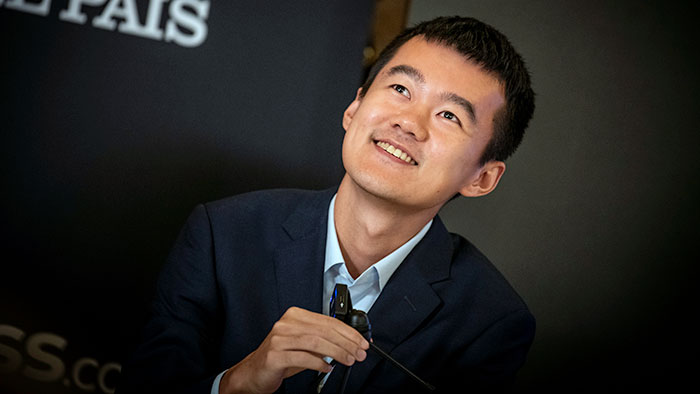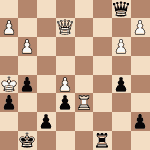At the start of the 2022 FIDE Candidates Tournament, Alireza Firouzja and Ding Liren were the favorites by rating. Liren had the highest FIDE rating of any Candidate, 2806 on the June FIDE list. Firouzja was second-highest rated Candidate, at 2793. Yet the fourth-highest rated Candidate, Ian Nepomniachtchi (2766 on the June list), won the Candidates. Winning the Candidates qualifies Nepomniachtchi to play a match for the title of World Chess Champion. The match had been planned against World Chess Champion Magnus Carlsen. However, Carlsen announced on July 20th that he would not defend his title. Nepomniachtchi will play Ding Liren for the World Chess Championship.
Earlier in this World Chess Championship cycle was the 2021 World Cup. Its top two finishers earned spots in the 2022 FIDE Candidates Tournament. To pair its single elimination matches, the World Cup ranks each of its participants by their chess ratings. Thus, the World Cup provides data for the question, “Do ratings favorites win World Chess Championship qualifiers?”
Thanks to my son William Root for researching this question for the nine past World Cups.

Photo courtesy of FIDE / David Llada
Comparison to eSports
Before plunging into an analysis of the World Cup in chess, William looked at statistics for Super Smash Bros. games, as analyzed by a Panda Global website. By the way, Panda Global has a chess connection! It is the eSports team of chess streamer and WFM Anna Cramling.
According to PGstats, “Top 8 seeds make up 70% of Melee top 8s but just 60% of Ultimate LAN top 8s and only 55% of Ultimate WiFi top 8s.” Those Super Smash Bros. tournaments are double elimination.
The World Cup in chess is single elimination, which may make it less likely for top seeds to survive to the top 8 (quarterfinals). One bad match in the World Cup means the end for that losing player. There is no redemption possible through a loser’s bracket run, in contrast to Super Smash Bros.
World Cup in Chess
The year 2021 was an odd one for the World Cup, due to an expansion of the field from 128 to 206 players and because there were players exposed to Covid-19 who were not able to complete their games. By the quarterfinals, the following seeds remained: 1, 10, 12, 13, 30, 31, 41, 86. The semi-finals consisted of seeds: 1, 10, 12, and 30; and the finals had seeds 10 and 12 with the twelfth seed, Jan-Krzysztof Duda, winning.
The World Cups listed next each had 128 players and served as a qualifier for the Candidates.
In 2019, the following seeds made the quarterfinals: 1, 3, 6, 9, 10, 12, 20, and 31; The semi-finals consisted of seeds: 1, 3, 10, 12; and the finals had seeds 1 and 10 with the 10th seed, Teimour Radjabov, winning.
In 2017, the following seeds made the quarterfinals: 2, 5, 8, 11, 16, 26, 29, and 51. The semi-finals had seeds: 2, 5, 8, and 11; and the finals had seed 5 and 11 with the fifth seed, Levon Aronian, winning.
In 2015, the following seeds made the quarterfinals: 2, 4, 11, 16, 19, 21, 24, 26. The semi-finals consisted of seeds 4, 11, 16, and 26; and the finals had seeds 11 and 16 with the eleventh seed, Sergey Karjakin, winning.
In 2013 the following seeds made the quarterfinals: 2, 3, 8, 13, 21, 22, 23, and 32. The semi-finals consisted of seeds 3, 21, 23, and 32; and the finals had seeds 3 and 21 with the third seed, Vladimir Kramnik, winning. The 21st seed, Dmitry Andreikin, was the lowest-seeded player to ever make a World Cup final.
Continuing the journey into World Cups past, 2011 and 2009 were the two years when the most top eight seeds (five) made it into the eight-player quarterfinals.
In 2011, the quarterfinals had seeds: 2, 4, 5, 6, 7, 9, 14, and 33. The semi-finals had seeds: 2, 4, 6, and 9; and in the finals were seeds 6 and 9 with the ninth seed, Peter Svidler, winning.
In 2009, the following seeds made the quarterfinals: 1, 2, 3, 7, 9, 12, 13, and 22. The semi-finals had seeds 1, 7, 12, and 22; and the finals had seeds 1 and 7 with the top seed, Boris Gelfand, winning! See the next section of this article for one of his winning games.
The 2007 World Cup quarterfinals had seeds: 5, 8, 10, 11, 13, 14, 17, and 31. The semi-finals had seeds: 5, 10, 11, and 17; the finals had seeds 5 and 11 with the eleventh seed, Gata Kamsky, winning. The 2007 World Cup is one of two times that an 11th seed won, see also 2015 when Karjakin as eleventh seed won.
In 2005, the last on our list of World Cups which were part of the FIDE World Chess Championship cycle, the quarterfinals had seeds: 2, 3, 4, 5, 9, 17, 38, and 39. The semi-finals had seeds 2, 3, 4, and 9; and the finals had seeds 3 and 9, with third-ranked Levon Aronian winning. The 2005 World Cup is one of two times that the third seed won, see also 2013 when Kramnik as third seed won.
Thus, the third seed and the eleventh seed have won two times each. Yet, the top seed has won only once.

2009 World Cup: When the top seed won
A ChessBase interviewer stated, “The situation when the top seeded player wins a tournament is rare.” The 2009 World Cup winner Boris Gelfand replied, “I was not impressed by the fact that I was top seeded. There were about 20 chess players who had every reason to expect to win the Cup.” Judging from nine World Cups analyzed in this article, Gelfand is right. The top 20 ranked players have been well represented in quarterfinals, semi-finals, and even the finals.
Here is a Gelfand win from the finals.
